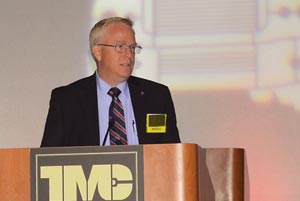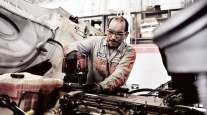Execs: Trim Aftertreatment Repair Costs With Training, Preventive Maintenance

ORLANDO, Fla. — Maintaining diesel emissions aftertreatment systems can be quite costly, but preventive maintenance and employee training will give fleets a chance to minimize repair bills, engine and fleet executives said.
Kirk Altrichter, vice president of maintenance at Crete Carrier Corp. and a past Technology & Maintenance Council chairman, brought attention to the issue during the TMC’s fall meeting here when he expressed frustration with emissions regulations. He said the standards can cause a “catastrophic” event for fleets with equipment needed to meet the standards.
“Fleets are being eaten alive by emissions-related problems” and may be spending 25% of their maintenance hours on the issue, he said. “That is a lot of technician time — a lot of downtime.”
To limit downtime, Kevin Otto, aftertreatment systems program leader for engine maker Cummins Inc., urged fleets not to ignore fault lamps and codes.
“In the past, you could get away with this, but today’s [onboard diagnostics] faults can lead to severe derates” of performance. Not taking quick and appropriate action “could be doing things to the engine or aftertreatment that lead to the failure of an expensive component,” Otto said.
It was also a message shared by Vic Meloche, an executive with Daimler AG’s Detroit engine unit. “Proper care is essential. Anything upstream will affect the aftertreatment.”
Meloche was one of several panelists at a technical session at the TMC meeting Sept. 21 to refer to the engine aftertreatment as the “diaper for the engine.”
However, Altrichter said one of his biggest frustrations does not involve complex fault codes but instead how simple it can be to mix up diesel and diesel exhaust fluid, or DEF. He said putting DEF into the fuel tank could be a $15,000 mistake, with the reserve costing $5,000 or more.
He called for installation of sensors to help prevent the mix-up from occurring, and Meloche said accidental cross-contamination also could be caused by sloppy use of funnels.
Brian Lewis, a former TMC SuperTech champion who works for Wal-Mart Transportation, also emphasized the need to test diesel exhaust fluid before technicians put it into any trucks.
The first “troubleshooting step” is checking DEF quality with a refractometer, he said. “You can’t shortcut this.”
Lewis added that such careful attention to detail is mandatory for technicians to be successful. Not only do they need to know the location of critical components on the different vehicles their fleets are using, but they need to stay up on the rapid technological changes that are taking place, he said.
Cummins’ Otto also said making sure a diesel particulate filter, or DPF, is sufficiently cleaned helps make sure the entire aftertreatment system works smoothly. Otherwise, the truck will need to come back for additional cleanings more quickly than projected, he warned.
Meloche echoed that point, saying that ash and soot are both competing for a limited amount of space in a DPF. Without thorough cleanings, it could disrupt DPF intervals and have a trickle-down effect on other parts of the aftertreatment system.
Otto said driver training and pre-trip inspections also are critical tools in recognizing a potential problem before it escalates — so, too, is understanding the different fault-code guidelines among individual equipment manufacturers.
In fact, avoiding aftertreatment problems starts when fleets spec a new truck, Otto said.
“Don’t buy more horsepower than you need. Lower horsepower works the engine harder,” he said. That will keep temperatures up, helping the DPF to stay cleaner.
Otto and Meloche said trucks that work in cold weather or see extended idling are among the vehicles likely to need closer monitoring than more traditional over-the-road tractors.
“It is important to understand the duty cycle and the impact to the aftertreatment system,” Meloche said.




